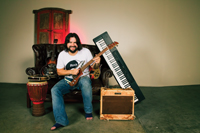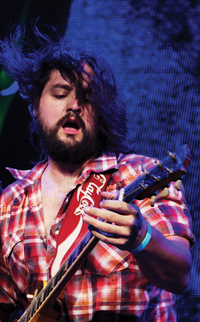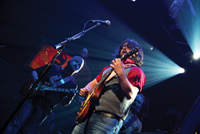The Key Is Versatility
With a range of musical styles and instruments in his bag of tricks, Clay Cook '98 has found a home for his multifaceted talents in the Zac Brown Band.
 |
Clay Cook was seemingly destined to make his mark in the music business. During his Berklee years, he and two guys in the dorm room across the hall began to write and record songs together.
One of those guys was John Mayer '98, and a handful of the early songs cowritten with Cook ended up on Mayer's platinum-selling albums. Additionally, one of the masters engineered and mixed in the dorm room by Matt Mangano '00 (the third member of the trio) appeared on Mayer's 1999 EP Inside Wants Out.
After leaving Berklee, Cook returned to his native Georgia and spent the next several years touring and recording with the Marshall Tucker Band, Sugarland, and local artists before joining the Zac Brown Band (ZBB) in 2009. Brown tapped Cook for his musical versatility. Cook has rock-solid chops on guitar, keyboards, mandolin, and steel guitar, sings soaring harmonies, and has great ideas for song arrangements. Cook jumped aboard while the band was gaining momentum. At the time, the song "Chicken Fried" from ZBB's first Atlantic album The Foundation had topped Billboard magazine's Hot Country Songs chart. At that point, the group's success was hardly ensured, but Cook sensed that joining the band was the right move.
During an interview at the band's Atlanta headquarters, Cook recalled the humble early days touring the country with Brown's crew of 12 and a dog. Since then things have grown considerably. "Now we're 70 people - and a dog," Cook says with his trademark wry smile. This summer ZBB extended its reach beyond North America with July appearances in England.
The Foundation yielded four additional hit singles before the band released its 2010 follow-up album You Get What You Give. Celebrity vocalists Alan Jackson and Jimmy Buffett made cameo appearances on the singles "As She's Walking Away" and "Knee Deep," respectively. The video for another single, "Colder Weather," was nominated in two Country Music Television (CMT) award categories. On the June 8 broadcast, the band won in the CMT Performance of the Year category for its rendition of "Margaritaville" with Jimmy Buffett.
 |
Cook's instrumental and vocal finesse are readily apparent on You Get What You Give. His acoustic piano parts range from poignant on "Colder Weather" to rollicking on "I Play the Road," where he channels Chuck Leavell, the virtuosic Rolling Stones and Allman Brothers Band pianist. Cook shines on the Hammond B3 on several songs, but especially in his rhythmic solo on the calypso-flavored "Settle Me Down." His airy steel-guitar lines tug the heartstrings on the bittersweet country ballad "Cold Hearted" and his mandolin stokes the rhythm of the tongue-in-cheek bluegrass barnburner "Whiskey's Gone."
But first and foremost, Cook is a guitarist. Opening a recent ZBB show at the packed 20,000-seat Nationwide Arena in Columbus, Ohio, Cook stood at center stage with a white Strat playing the funky rhythm guitar intro to "Keep Me in Mind." Later, he displayed both virtuosity and showmanship during his rocked-out, unaccompanied guitar solo spotlight in "Who Knows." Standing on the runway playing alternately to both sides of the arena, he invited the thronging fans on opposing sides to demonstrate who could applaud louder as the licks got faster. Throughout the two-hour show, the audience was on its feet singing the lyrics to virtually every song. With a growing list of radio hits and show-stopping covers such as "The Devil Went Down to Georgia" that must be part of every show, the band now plays long sets to include everything fans expect and to introduce new material.
A Stone Mountain, Georgia, native, Cook has clearly found his hoped-for niche since he left Berklee. ZBB has won numerous awards, including two Grammys, and has become a staple on country radio. There's a bit of irony to the group's radio success. While the band has gained a huge following through its radio hits, its stylistic boundaries include lots of territory outside the country-radio format. Forays into southern rock, reggae, bluegrass, folksy ballads, and blues have gained the band many die-hard fans that enthusiastically follow the group wherever the music goes. For Cook, it's the musical journey of a lifetime.
What was your entrée into music?
Just by proximity, there's always been music in my life. I remember from childhood, my mother singing harmony to the songs on the radio. So I picked up the ability to sing and pick out a harmony at a young age. My uncle, my mom's brother [Doug Gray], is the lead singer for the Marshall Tucker Band. Another thing: my stepfather owned a music store. I showed interest in guitar, and by eight, I was taking a lesson every Saturday. My instructor, Joe Carpenter, was a fantastic teacher. He taught mainly the Spanish guitar style, but he also taught jazz standards as well as songs by the Eagles, Buddy Holly, and the Ventures. He taught me reading and music theory and trained my ears. In later years, he taught me mandolin and a bit about pedal-steel guitar.
What prompted your decision to enroll at Berklee?
I was actually torn with my decision because I didn't know if I was going to be a drummer or a guitarist. It was between Berklee and the University of Georgia - where I could have gotten a full ride. I was also considering joining the Marine Corps marching band as a drummer with the possibility of doubling as a guitarist in the jazz band. Then I took a trip to Boston and not only did I fall in love with Berklee after taking the tour but also I fell in love with the city. Boston is still one of the top three cities for me. If I had to leave Atlanta, I would move to Boston or Austin.
 |
What was the focus of your studies?
You don't get to declare a major very early. But I was in MP&E for a semester, and then switched over to professional music because I would be able to take some drum courses. I ended up being in the gospel choir and Overjoyed, the smaller version of the gospel choir. So I started really singing at Berklee. I'd never worked on it before; it just came naturally to me. I was in a couple of ensembles including the senior showcase band as a guitarist during my last semester. I really focused on the classes and projects, and getting into the studio as a session guy or being an assistant to some of the upperclassmen engineers.
Can you talk about some of the friends you met at Berklee?
John Mayer and Matt Mangano lived across the hall from me in the dorms on the seventh floor of the 150 [Massachusetts Avenue] building. They were roommates, and we were all friends. We spent a lot of time together writing songs. We were staying up until 5:00 in the morning writing. Neither John nor I had written before, until we met each other. It was a point in our lives when we were both learning how to write music-singer/songwriter kinds of things. Those were some of the best times of my life because there was very little pressure, other than to get good grades. We were filling all the rest of the time. We weren't chasing girls or drinking; we were just trying to figure out how to make good songs. And that was so exciting.
Didn't some of those songs end up on John's first recordings?
Yeah. We recorded a few things in the room - which you weren't supposed to do. But we recorded a song called "Comfortable" on Matt Mangano's ADAT in the dorm room. It's Matt's mix that ended up on John's first EP. We had Casey Driessen ['00] playing violin in the string section and did it all - drums and everything - as overdubs in that room. I don't know how we never got caught! They didn't look too highly on that sort of stuff.
After that, the three of you ended up in Atlanta. Did you move there together?
No, Matt stayed [at Berklee] to get his degree. When I first got to Berklee, I'd made a list of the knowledge I wanted to get, who I wanted to take lessons from, and what shows I wanted to be a part of. I accomplished everything on my list in four semesters because I went a little crazy there - I went at it full force.
John wasn't going to continue, so we made a plan. I said to him, "You go home for a little bit, and I'll get my feet dug in [in Atlanta]." A few weeks later, he bought a plane ticket and flew down, and we got an apartment together. I got him a job at the tape duplication house where I was working. I was repairing VCRs and John was loading and unloading the VCRs and putting labels on the cassettes.
 |
Were you also writing songs or playing gigs?
We would try to write together, and maybe once a week we would do a gig playing the new songs. "No Such Thing," John's first hit, was written then, as was "Neon." About five or six of the songs we wrote together later made it onto his albums.
You two went in different directions after that. Is that when you started digging into the Atlanta scene on your own?
No, I went to California and moved in with my dad for a little while. That was sort of a soul-searching trip. I was trying to figure out what to do with my life. John stayed here, and then about two years later, Matt graduated from Berklee and moved down. He joined John's band, John got a record deal, and they made a record.
John's albums have sold well. Your share of the songwriter royalties must have helped as you were contemplating your next move.
Yeah, they paid for my house, my car, and other stuff. They definitely supplemented my income.
Was it hard for you to become proficient on so many different instruments?
Compared to learning my first instrument, it's felt effortless to learn another. I'll be getting better at mandolin for the rest of my life, but it was easy to pick that up because I understood chord shapes and how the fretboard works. Also the mechanics of it I'd learned from playing guitar. For pedal steel, I took one lesson from Mike Ihde at Berklee, and another from my teacher down here. We did a tour with Rusty Young [an original member of Poco] when I was just bringing the steel guitar out. He sat me down showed me a couple things. I stole a lot of what I do from Marshall Tucker Band songs and from the steel playing on Neil Young's Harvest record. Overall, I've learned a lot just by just tooling around on my own. Knowing what to play and when or when not to play really comes from your own life experience.
What was the first break you got?
While I was in California, my uncle [Doug Gray of the Marshall Tucker Band] called and said, "Do you know how to play woodwinds?" I'd never played any of that stuff before in my life, but I said, "Yes, when do you need me?" He said, "In about a month."
I hung up the phone and I went to a pawn shop and I bought a flute and a saxophone. I taught myself enough to play the parts on their songs. My duties in the band included playing flute, sax, Hammond organ, and piano. It was a crash course for me on the Hammond. For the first 10 gigs, I had no idea what I was doing with the thing, but I ended up falling in love with it.
| "They're going to have to kill me to make me leave this band! I love being here and having so much input on the music." |
How long did you stay with the band?
I played with them for three years. I'd moved back to Atlanta when I got the Marshall Tucker job because their headquarters is in Spartanburg, South Carolina, which is a three-hour drive from here. After I quit, I became the bass player for Sugarland for a year. I played on their first record, and then I left.
That's when the Mayer money started coming in. I bought a bunch of recording equipment and just taught myself how to engineer and produce. I read books, tried things, and made records for people for free, and got some guidance from a couple guys around town.
Is that how you learned to use Pro Tools?
Yes, and I'm still learning all that it can do. Through my work in the studio, I met [singer/songwriter] Shawn Mullins. I started playing guitar, mandolin, and Wurlitzer piano with him around 2004. We went around the country twice in an RV. Once that tour ended in 2006, I was scrambling for work, and my uncle called again to say that Marshall Tucker needed a guitar player. So I brought out the pedal steel and the electric guitar and played with them for two more years, and then Zac Brown called.
How did Zac come to know you?
I think my band opened up for him in 2003 or 2004, somewhere downtown. Also, his bass player, John Hopkins, and I were sharing a studio space then, so I would run into Zac quite often. I'd also crossed paths a bit with Coy Bowles, who plays guitar in the band.
When Zac asked you to join the band, was your facility with several instruments a major factor?
Oh, that was definitely the thing. The fact that I could sing the high harmonies was also a selling point. I also bring something different to the table, not just musically, but as a personality. I have a completely different way than the other five guys of looking at and arranging a song. Everybody brings something to the table in this band. I don't know if it would fall apart if one guy wasn't here, but it would certainly be different.
When you joined, did you feel that Zac's band was positioned for stardom?
Actually, for my first year with Zac, I took a huge pay cut. He'd had only one hit on the radio at that time. So it was a step back from the Marshall Tucker Band. That band had their own equipment truck, and we were flying to a lot of the gigs. But with Zac, we were playing five or six times a week. The band and a dog were all on one bus - every bunk was full. We pulled the equipment in a trailer behind us. We worked really hard the first year that I was in the band, but they'd worked even harder before I joined.
I knew that this was a good thing, but to be honest, I had no idea that it was going to get like this. I'd wanted to be a part of something that was taking off. With the Marshall Tucker Band, the people were coming to see us play the music from 1974. And while I was a huge fan of that music and loved playing it, I wanted to be a part of something from the beginning stage. So I've finally made my mark, and I'm working with guys who are my own age. These guys are my friends; they are the best people I know.
I felt that even if we were to make only a marginal splash in the country world, it was the right decision to go with this band.
Zac Brown's music touches on southern rock, jam tunes, calypso, and reggae grooves as well as straight-ahead country and must be really fun to play.
It is. We try not to be too schizophrenic style-wise. The biggest thing that I've learned with this band is how important the song is and that we need to serve it correctly to the people. Live performance is where [this band] exists. The recordings are just so people will know the words when they come see us play. We don't care if we sell a billion CDs. The only reason we make records is to make sure people are prepared when they come to see us play.
But isn't it also pretty great to hear your songs on the radio?
Yeah, I heard "Knee Deep" - our newest single - on the radio for the first time today on my way over here. I was pretty excited about that. We just made a video for that song in Mexico. It's going to be pretty cool.
Zac and Wyatt Durrette write the majority of the band's songs. How do the arrangements take shape?
The process of working on a new song usually starts at vocal warm-up. We get together in Zac's bus for half an hour before each show and sing. That's usually where we work out vocal harmonies for a new song. Usually it's just Zac playing the guitar, and we find spots where harmonies will be powerful and add to the song's momentum. It's actually pretty scary how quickly we come up with our parts. Harmonies are important; they're kind of a subconscious cue for the audience to sing along when they hear us singing.
On days when we have a sound check in the venue, Zac will start playing the [new] song. We all get in there and make sure that it's grooving right and discuss stops and that sort of thing. If it needs another musical section or a solo section, we work on it. For the guitar parts, Zac will sing something, or Jimmy [the violinist] will play something. We may add [an instrumental] harmony to that line. It's all pretty organic; things just kind of happen. Once we feel a song is ready at sound check, we'll play it that night.
Even though the band isn't really part of the Nashville fold, it has had several hits on country radio.
We're among a very few not playing the Nashville slot machine. Our management has an office in Nashville so that we can be in the loop with what's going on with CMT and GAC [Great American Country], which are the video music channels for country music. We're kind of plugged in there. We have an amazing radio team that works only for us. Zac talked to this one fellow named Michael Powers and said, "Go put together a radio team that will work year round just for us." That seemed like a crazy decision in the beginning. But because they did such a good job and because country radio latched on to what we do, it's paid for itself 10 times over. Zac is easily the best businessman I've ever met in my whole life.
I know you have a studio in Atlanta. What kind of work do you do there?
Well, the last two Zac Brown Band records, The Foundation and You Get What You Give, were done in my studio with Keith Stegall producing and John Kelton engineering. I produced and engineered a new record there for Coy Bowles. We finished it up about a month ago. It's really cool, kind of a soul record.
Are you working on another solo album?
Yeah. I just started. Two weeks ago, we did basic drums, and bass, and I did a scratch guitar and vocal parts. A week ago, I worked with Matt Mangano, he's coproducing it with me. I played all the acoustic guitars for the record. The problem is that with my schedule, I can work on the record only here and there. But by the end of the summer, I should have it all tracked.
Did you write all the songs?
Wyatt Durrette and I wrote one song together, and there will be a couple of old John Mayer/Clay Cook songs that never really saw the light of day. I'm actually reworking "Man on the Side," which was on John's live album. And then there was a song we wrote together called "North Star" that will be on the new record. I'm pretty excited about all of it.
My last album was just sold at shows and a little bit on iTunes. It sold a couple thousand copies. It's great that people are buying it and listening to it and writing in saying which is their favorite song. That just makes you feel good, like you're doing something important as an artist.
And are you going to release the new one independently?
No, it's going to be on Zac's Southern Ground label.
How do you see your career unfolding in the future?
They're going to have to kill me to make me leave this band! I love being here and having so much input on the music. The fans are really great - good people. They love our music and respect us and our space.
I'm also going to be a solo artist all my life. I see the Zac Brown Band working six or seven months a year in the future. During the time that they take off, I want to do a couple months of playing my own gigs and maybe a month on a tour as a multi-instrumentalist for some other singer/songwriter - Sheryl Crow or an artist along those lines whose music I really love. I really identify with being an auxiliary man onstage and I'm very comfortable playing country, alt-country, southern rock, and even rock 'n' roll. So, you know, if it's not going to get in the way of Zac's band, I'd like to find another artist each year to go out and play with.
Is there anything I didn't ask about that you'd like the Berklee today readers to know?
I don't really know how to word this, but I don't know if I would have ended up here without Berklee. I was already a musician and going in a good direction as a performer, but the theory and the ear training that I received there and then the contacts that I made were so important. Without the contact I had with John Mayer, Matt Mangano, and eventually Casey Driessen, I would be in a completely different place. Without the knowledge I gained, I'd be in a different place. I guarantee I would still be making music, but I might just be in a weekend band. I have no idea where I would have ended up.
